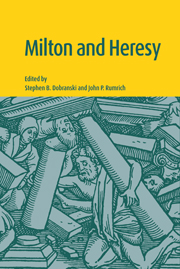Book contents
- Frontmatter
- Contents
- List of contributors
- Acknowledgments
- Abbreviations
- Introduction: Heretical Milton
- PART I HERETICAL THEOLOGY
- PART II HERESY AND CONSEQUENCES
- 4 Milton's Arianism: why it matters
- 5 “Elect above the rest”: theology as self-representation in Milton
- 6 Milton's kisses
- PART III HERESY AND COMMUNITY
- PART IV READERS OF HERESY
- Index
4 - Milton's Arianism: why it matters
Published online by Cambridge University Press: 10 October 2009
- Frontmatter
- Contents
- List of contributors
- Acknowledgments
- Abbreviations
- Introduction: Heretical Milton
- PART I HERETICAL THEOLOGY
- PART II HERESY AND CONSEQUENCES
- 4 Milton's Arianism: why it matters
- 5 “Elect above the rest”: theology as self-representation in Milton
- 6 Milton's kisses
- PART III HERESY AND COMMUNITY
- PART IV READERS OF HERESY
- Index
Summary
In a preliminary report by the committee studying the provenance of de doctrina Christiana, Gordon Campbell stated that arguments based on the treatise's coherence with the accepted canon of Milton's works remind him of Fluellen's case for the resemblance between Henry V and Alexander the Great: “There is a river in Macedon, and there is also moreover a river at Monmouth … and there is salmons in both.” Though Campbell assumed authorial responsibility, C. A. Patrides was the original wag. He quoted Fluellen a generation ago to deride Maurice Kelley's use of de doctrina as a theological guide to Paradise Lost. Ironically, Patrides authored Milton and the Christian Tradition, a work that to characterize Milton's epic theology casts its nets into the boundless deep of more than fifteen centuries of Christian religious writing. Kelley at least was fishing for trout in a peculiar river – one that he had, moreover, definitively charted.
Campbell's unacknowledged revival of Patrides's resile mockery indicates that the controversy over Milton's authorship of de doctrina springs in part from obscure sources. More than half a century ago, Kelley first argued systematically that the coherence of Paradise Lost and de doctrina Christiana is far-reaching, detailed, and, in their shared deviations from Christian orthodoxy, distinctive. Perhaps Kelley's original description of the theology as a gloss on the poetry slights the integrity of distinct modes of discourse. But he did not overstate the broad intellectual coherence and large consistency of the poet-theologian who produced both. Others – Barbara Lewalski, William Kerrigan, and Stephen Fallon notable among them – have fortified Kelley's general claim through credible interpretation of Milton's poetry that rests substantially on reference to de doctrina.
- Type
- Chapter
- Information
- Milton and Heresy , pp. 75 - 92Publisher: Cambridge University PressPrint publication year: 1998
- 14
- Cited by



